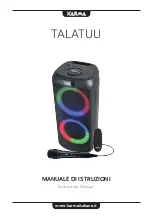
1135DB Wireless Siren
Description
The Model 1135DB Wireless Siren provides 110 decibels of annunciation and comes
with a wall, cover tamper, survey LED, and two batteries. Multiple sirens can be
activated simultaneously by the panel via the Trip with Panel Bell feature.
Compatibility
All DMP 1100 Series Wireless Receivers and Panels
What is included
The 1135DB includes the following:
• One 1135DB Wireless Siren
• Two 3.0V Lithium CR123A batteries
• Hardware pack
• Serial number label
• Double-sided tape
Serial Number
For your convenience, two additional pre-printed serial number labels are included for the siren output. Prior to installing
the wireless siren, record the serial number or place the pre-printed serial number label on the panel programming sheet.
This number is required during programming.
Programming the 1135DB Siren Output in the Panel
Refer to the appropriate panel programming guide as needed. In Output Information, enter an output number, output
name, eight-digit serial number, supervision time, and set the Trip with Panel Bell option to YES.
Trip with Panel Bell Option
Select YES to have the 1135DB Wireless Siren follow the panel bell output
including bell cutoff time. The ON/OFF state of the siren cannot be changed
via the output menu or any other panel function. Default is YES.
Note
: When the panel is reset, or programming is complete, the supervision
time is reset. If the panel has been powered down for more than one hour,
the 1135DB may take up to an additional hour to send a supervision message
unless tripped, tampered, or powered up. This operation extends battery life.
A missing message may display on the keypad until the supervision message is
sent. In addition, if the siren is on when the panel is powered down, the siren
automatically turns off after 15 minutes.
Installing the Wireless Siren
Selecting a Location
The 1135DB provides a survey capability to allow one person to confirm
communication with the receiver while the cover is removed. The 1135DB
PCB Red Survey LED (See Figure 2) turns on brightly whenever data is sent to
the receiver then immediately turns off when the receiver acknowledgement
is received. Pressing the tamper switch is a convenient way to send data to
the receiver to confirm operation. When the 1135DB does not receive an
acknowledgement from the receiver the survey LED remains on for about 8 seconds to let you know communication is
not established. Communication is also faulty when the LED flashes brightly multiple times in quick succession. Relocate
the 1135DB or receiver until the LED immediately turns off when tampered indicating the 1135DB and receiver are
communicating properly. Proper communication between the 1135DB and receiver is verified when for each press or
release of the tamper switch, the LED blinks immediately on and immediately off.
Tamper Switches
The 1135DB is equipped with a case tamper and a wall tamper. A two position header is
provided to disable the wall tamper. To disable the wall tamper, place the jumper across
the two pins of the header. If wall tamper is required, place the jumper over just one
pin for storage.
Note
: If mounting using the supplied double-sided tape, the wall tamper must be
disabled.
Mounting the Siren
1. Remove the locking screws from the top and bottom of the siren housing. Lift the
cover from the bottom to remove.
2. Mount the 1135DB on a flat wall ensuring that the wall tamper switch makes proper
contact with the wall. Use the supplied screws in the mounting hole locations as
shown in Figure 2, or use the supplied double-sided tape. Mount the siren away
from metal objects. Do not install the 1135DB within 4 feet of the panel as the RF
gain of the transmitter may inhibit proper communication.
3. Set the cover back into place and replace the locking screws.
Figure 1: 1135DB Wireless Siren
Figure 2: Survey LED and Mounting Holes
Mounting Holes
Model
1135
RED LED
(SURVEY)
TAMPER
SWITCH
SOUNDER
Mounting Holes
Red
Survey
LED
Locking Screw
Locking Screw
WALL
TAMPR DIS
Coil
Board
Tamper
Disable
Figure 3: Wall Tamper
Wall
Tamper
INSTALLATION GUIDE




















